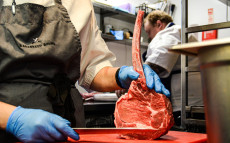- pathfindersAI
- Job Profile
Food Preparation Workers
Summary
Food Preparation Workers: A Career Exploration
What They Do
Food Preparation Workers play a pivotal role in the culinary and hospitality industry. They are the unsung heroes behind the scenes, ensuring kitchens run smoothly and efficiently. These individuals are involved in preparing ingredients and dishes under the guidance of chefs and other culinary professionals. Their tasks include washing, chopping, and slicing vegetables, as well as preparing meats, poultry, and seafood for cooking. They may also be responsible for mixing ingredients for salads, soups, or other dishes, and maintaining stock levels of various kitchen supplies. Although their roles can vary depending on the establishment, their main focus remains consistent: aiding in the creation of quality food experiences for patrons.
Job Responsibilities
The responsibilities of Food Preparation Workers are diverse and multifaceted. Firstly, they are responsible for maintaining a clean and organized workspace, which is imperative for food safety and efficiency in a busy kitchen environment. They must adhere to stringent health and sanitation guidelines, such as proper food storage and handling practices. Additionally, they often assist chefs by measuring and preparing ingredients, following recipes, and occasionally helping with the actual cooking process. They are also tasked with operating kitchen equipment, which includes everything from mixers and blenders to industrial-sized machines. In some settings, they may be involved in plating and garnishing dishes to ensure they meet aesthetic standards before being served to customers.
Essential Skills
To excel as a Food Preparation Worker, one must possess a blend of hard and soft skills. Attention to detail is paramount; precision in measuring ingredients and careful adherence to recipes can make the difference between a dish that is merely good and one that is outstanding. Physical stamina is also crucial, as the job often requires standing for long periods, lifting heavy objects, and performing repetitive tasks. Good communication skills are vital for effective teamwork in a bustling kitchen environment. Additionally, a thorough understanding of food safety protocols and sanitation standards is essential. Lastly, a willingness to learn and adapt is invaluable, as the culinary field is ever-evolving with new techniques and trends.
Educational Pathways
While formal education is not always mandatory for Food Preparation Workers, possessing certain educational qualifications can significantly enhance job prospects and career advancement. Many individuals begin their journey by obtaining a high school diploma or GED. Following this, aspiring Food Preparation Workers may opt to enroll in vocational programs or community college courses focused on culinary arts. These programs often provide hands-on training and cover critical topics such as food safety, knife skills, and basic cooking techniques. Some may also pursue certification through recognized institutions, which, although not obligatory, can demonstrate a commitment to the profession and provide a competitive edge in the job market.
Career Prospects
The career prospects for Food Preparation Workers are promising and varied. Entry-level positions are commonly available in a wide range of establishments, including restaurants, hotels, cafeterias, and catering services. With experience and additional training, many Food Preparation Workers advance to roles such as line cooks, sous chefs, or even head chefs. The culinary field is known for its dynamic and fluid career paths, often providing opportunities for rapid upward mobility based on skill, dedication, and performance. Moreover, the growing interest in food culture and gastronomy has led to an increase in demand for skilled culinary professionals, further widening the scope for career growth and specialization.
Conclusion
In conclusion, the role of a Food Preparation Worker is integral to the success of the culinary environment. These professionals ensure that kitchens operate smoothly and contribute significantly to the overall dining experience. With a diverse set of responsibilities and essential skills, Food Preparation Workers are well-equipped to support culinary teams effectively. Although formal education is not always a prerequisite, pursuing educational pathways can lead to enhanced career prospects and opportunities for advancement. As the culinary industry continues to evolve, so too do the opportunities for those dedicated to mastering the art and science of food preparation.
Video
Compensation
| State | Median Salary | Median Hourly | Positions |
|---|---|---|---|
| AL | 23,880 | 11.48 | 16,310 |
| AK | 36,360 | 17.48 | 2,840 |
| AZ | 33,680 | 16.19 | 14,120 |
| AR | 28,850 | 13.87 | 4,530 |
| CA | 37,130 | 17.85 | 107,870 |
| CO | 37,470 | 18.02 | 13,050 |
| CT | 34,690 | 16.68 | 10,740 |
| DE | 30,080 | 14.46 | 1,870 |
| DC | 37,630 | 18.09 | 3,960 |
| FL | 31,950 | 15.36 | 70,830 |
| GA | 29,720 | 14.29 | 28,550 |
| HI | 36,360 | 17.48 | 4,130 |
| ID | 28,970 | 13.93 | 4,590 |
| IL | 31,660 | 15.22 | 39,660 |
| IN | 30,030 | 14.44 | 15,460 |
| IA | 28,700 | 13.80 | 5,490 |
| KS | 28,790 | 13.84 | 7,760 |
| KY | 27,630 | 13.29 | 9,720 |
| LA | 22,390 | 10.76 | 29,250 |
| ME | 34,020 | 16.36 | 6,690 |
| MD | 33,220 | 15.97 | 12,450 |
| MA | 36,520 | 17.56 | 15,230 |
| MI | 31,920 | 15.35 | 13,030 |
| MN | 33,810 | 16.25 | 18,860 |
| MS | 23,720 | 11.40 | 5,800 |
| MO | 28,670 | 13.78 | 17,000 |
| MT | 29,550 | 14.21 | 2,330 |
| NE | 29,690 | 14.27 | 6,910 |
| NV | 34,210 | 16.45 | 10,900 |
| NH | 34,420 | 16.55 | 3,250 |
| NJ | 34,670 | 16.67 | 25,920 |
| NM | 27,300 | 13.13 | 6,110 |
| NY | 36,540 | 17.57 | 51,920 |
| NC | 27,820 | 13.37 | 25,240 |
| ND | 34,390 | 16.54 | 620 |
| OH | 29,040 | 13.96 | 23,540 |
| OK | 28,110 | 13.51 | 6,790 |
| OR | 35,850 | 17.24 | 8,740 |
| PA | 28,640 | 13.77 | 22,030 |
| RI | 30,700 | 14.76 | 3,140 |
| SC | 28,320 | 13.61 | 16,930 |
| SD | 28,260 | 13.59 | 2,990 |
| TN | 27,090 | 13.02 | 21,220 |
| TX | 28,890 | 13.89 | 92,020 |
| UT | 31,590 | 15.19 | 7,190 |
| VT | 34,750 | 16.71 | 1,340 |
| VA | 29,280 | 14.08 | 18,260 |
| WA | 40,390 | 19.42 | 17,450 |
| WV | 27,510 | 13.22 | 2,980 |
| WI | 30,080 | 14.46 | 20,180 |
| WY | 31,140 | 14.97 | 1,820 |
Similar Occupations
In this area you will find other occupations that are close to the one you were viewing in tasks, knowledge and work environment. If the primary job profile you are viewing isn't quite to your liking, take a look around and see what else is available.
Basic and Premium Accounts have more alternative occupations available than the Free account.

Baristas - 35-3023.01
A barista is a skilled professional who prepares and serves coffee and espresso-based beverages in a café or coffee shop setting. They also handle customer orders, operate espresso machines, and ensure a high standard of drink quality and presentation.
-
$29,540/yr
Median Pay -
3,676,580
Number of Jobs

Butchers and Meat Cutters - 51-3021.00
Butchers and Meat Cutters are professionals responsible for preparing meat for consumer use by slaughtering, deboning, trimming, and cutting into various types of cuts, ensuring optimal quality and portion control. They also handle the storage, packaging, and display of meat products, adhering to sanitary and safety standards.
-
$37,650/yr
Median Pay -
136,330
Number of Jobs